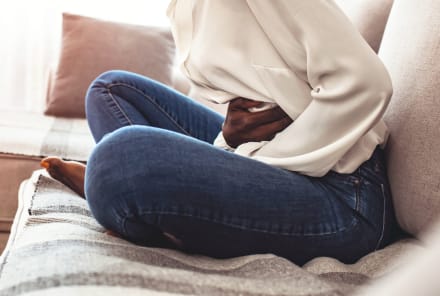Advertisement
Working Out This Many Hours Before Bedtime Will Negatively Affect Sleep Quality


Sometimes, the day gets away from you. Your window for exercise shrinks smaller and smaller until it's dark outside before you've had the chance to roll out your mat or lace up your sneakers.
While working out is a great way to support your health and get endorphins flowing at any time of day, we've long suspected that doing it too late can negatively affect sleep.
To put the theory to the test, a team from Concordia University in Montreal analyzed research on how nighttime exercise affects sleep quality—and their findings were just published in the journal Sleep Medicine Reviews1.
Studying how nighttime exercise affects sleep
For their systematic review and meta-analysis, the team, led by Emmanuel Frimpong, Ph.D., sifted through existing research on how high-intensity exercise before bedtime affects nighttime sleep. After weeding out research that was biased or unreliable, they were left with 15 studies that included 194 participants. All participants were healthy adults (ages ranged from 18 to 50) who did not report sleep difficulties.
From there, Frimpong's team examined this research pool to see how the timing, type, and duration of exercise affected sleep—as well as how participants' fitness levels and sleep chronotypes affected how they snoozed after their workout sessions.
They determined that overall, exercising at night did not disrupt nighttime sleep in most people—with one caveat. "When exercise ended less than two hours before bedtime, sleep was negatively impacted," Frimpong said in a news release. "It took longer for participants to fall asleep and sleep duration decreased."
Exercise that was completed two to four hours before bed did not disrupt sleep in the same way. In fact, Frimpong explained, "Our analysis showed that when exercise ended two hours before bedtime, there were sleep benefits, including the promotion of sleep onset and increased sleep duration." Although, interestingly enough, those who exercised two to four hours before bed spent less time in the REM sleep stage—where most dreaming occurs—compared to a no-exercise control.
Overall, the research concludes, exercising in the early evening, two to four hours before bed, seems to help sleep, not harm it—especially for those who spend most of the day sedentary. In the studies examined, cycling was the exercise that best supported deep sleep, and night owls tended to benefit from evening exercise more than early birds.
Why exercising at night is healthy
While it's not totally clear why working out at night can promote better sleep, it would make sense that doing so would tire you out for bed. There's also the possibility that the influx of endorphins that come during exercise could help put you in the right mindset for stress-free slumber.
However, anyone who's ever ticked off a tough HIIT class knows that high-intensity exercise dramatically raises heart rate and body temperature. And as psychologist and behavioral sleep medicine specialist Shelby Harris, PsyD, DBSM, previously told mbg, that sweaty, revved-up state is not conducive to relaxation. It's important to give yourself enough time—at least two hours, according to this review—to cool down and lower your heart rate before bed.
During that time, you'll want to eat a light snack that'll balance your blood sugar without keeping you awake, take a hot shower, ease into a relaxing nighttime routine, and maybe take a calming supplement to further prepare yourself for deep sleep.*
The bottom line
Exercising at any time of day will support your health, but research continues to find that doing so in the early evening will be most beneficial to many people's sleep. So the next time you find yourself procrastinating at bedtime, you might want to swap your phone scrolling with a spin session.
Watch Next
Enjoy some of our favorite clips from classes
Enjoy some of our favorite clips from classes
What Is Meditation?
Mindfulness/Spirituality | Light Watkins
Box Breathing
Mindfulness/Spirituality | Gwen Dittmar
What Breathwork Can Address
Mindfulness/Spirituality | Gwen Dittmar
The 8 Limbs of Yoga - What is Asana?
Yoga | Caley Alyssa
Two Standing Postures to Open Up Tight Hips
Yoga | Caley Alyssa
How Plants Can Optimize Athletic Performance
Nutrition | Rich Roll
What to Eat Before a Workout
Nutrition | Rich Roll
How Ayurveda Helps Us Navigate Modern Life
Nutrition | Sahara Rose
Messages About Love & Relationships
Love & Relationships | Esther Perel
Love Languages
Love & Relationships | Esther Perel
What Is Meditation?
Box Breathing
What Breathwork Can Address
The 8 Limbs of Yoga - What is Asana?
Two Standing Postures to Open Up Tight Hips
How Plants Can Optimize Athletic Performance
What to Eat Before a Workout
How Ayurveda Helps Us Navigate Modern Life
Messages About Love & Relationships
Love Languages
Advertisement

Yes, There's A Longevity Vitamin (& People Over 40 Need To Prioritize It)
Molly Knudsen, M.S., RDN

Study Investigates How Fasting Impacts Sleep, Hormone Health & More
Gretchen Lidicker, M.S.

Yes, There's A Longevity Vitamin (& People Over 40 Need To Prioritize It)
Molly Knudsen, M.S., RDN

Study Investigates How Fasting Impacts Sleep, Hormone Health & More
Gretchen Lidicker, M.S.

Yes, There's A Longevity Vitamin (& People Over 40 Need To Prioritize It)
Molly Knudsen, M.S., RDN

Study Investigates How Fasting Impacts Sleep, Hormone Health & More
Gretchen Lidicker, M.S.

Yes, There's A Longevity Vitamin (& People Over 40 Need To Prioritize It)
Molly Knudsen, M.S., RDN

Study Investigates How Fasting Impacts Sleep, Hormone Health & More
Gretchen Lidicker, M.S.















